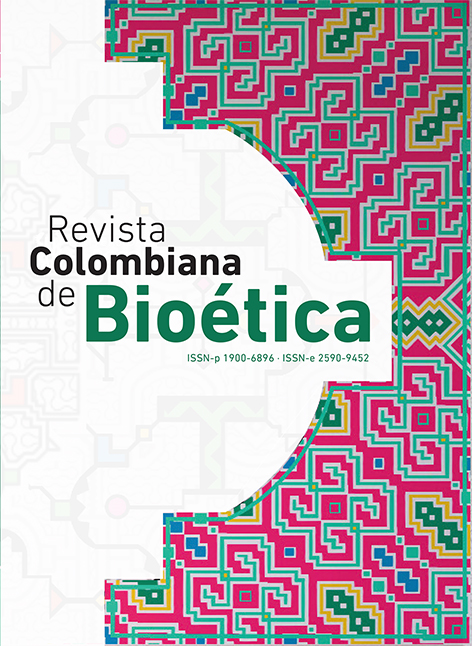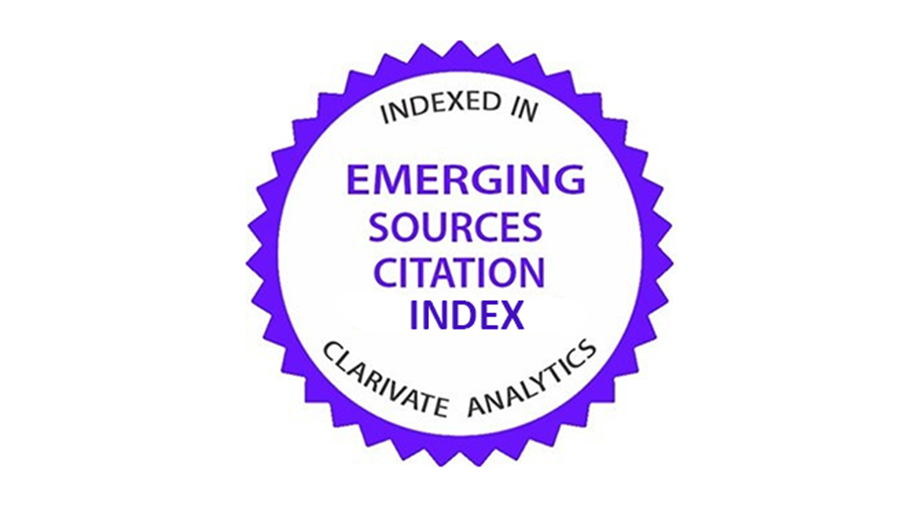Perspectivas feministas para la bioética
DOI:
https://doi.org/10.18270/rcb.v17i2.3864Palabras clave:
filosofía de la bioética, bioética feminista, fundamentos de la bioética, feminismo, interseccionalidad, autonomía relacional, vulnerabilidad, ética del cuidado, epistemologías feministasResumen
Propósito/Contexto. El artículo hace un recorrido por conceptos centrales de propuestas feministas contemporáneas para ofrecer análisis filosóficos, epistemológicos y políticos, útiles para la fundamentación y la práctica de la Bioética contemporánea. Se busca profundizar y problematizar conceptos centrales de teorías bioéticas como autonomía, justicia y vulnerabilidad, desde una perspectiva anclada en una comprensión de los fenómenos sociales y las subjetividades como inmersas en un entramado complejo de estructuras de poder.
Metodología/Enfoque. El texto se formula desde una perspectiva filosófica y analítica que construye un hilado de conceptos y categorías para la revisión y el enriquecimiento de algunos fundamentos de la Bioética contemporánea. Se acude a fuentes diversas de teorías feministas, teorías filosóficas y propuestas políticas para la construcción de una manera de situarse epistemológica y políticamente frente a los problemas bioéticos de la llamada perspectiva feminista.
Resultados/Hallazgos. Se propone que la adopción de una perspectiva feminista para la Bioética se entienda no como el conjunto reducido de problemas de las mujeres, ni como simple inclusión de mujeres en las discusiones bioéticas, sino como la adopción de una manera de situar, observar y analizar fenómenos sociales y problemas bioéticos desde una comprensión de las causas estructurales de las opresiones, que conciba al género, la raza, la clase social, la orientación sexual, la discapacidad y otros ejes de diferencia, como categorías de análisis centrales.
Discusión/Conclusiones/Contribuciones. La adopción de una perspectiva feminista implica una revisión crítica de los fundamentos del campo, particularmente del principialismo como versión más difundida, haciendo visibles algunas de sus limitaciones y consecuencias problemáticas. Asimismo, lleva a una revisión epistemológica de los saberes involucrados en el campo y a sus prácticas deliberativas, señalando la importancia de atender a las condiciones que impiden o dificultan el cumplimiento del compromiso político de la Bioética como espacio pluralista y transformador de las sociedades.
Descargas
Referencias bibliográficas
Abrams, Kathryn. 1998. “From Autonomy to Agency: Feminist Perspectives on Self-Direction.” William & Mary Law Review 805, no. 40.
Butler, Judith. 1990. “Gender trouble, feminist theory, and psychoanalytic discourse.” Feminism/postmodernism. Nueva York: Routledge.
Crenshaw, Kimberle. 1990. “Mapping the margins: Intersectionality, identity politics, and violence against women of color.” Stanford Law Review 43, no. 6: 1241-1299. https://doi.org/10.2307/1229039
Curiel Pichardo y Rosa Ynés Ochy. 2009. “Descolonizando el feminismo: una perspectiva desde América Latina y el Caribe.” Primer Coloquio Latinoamericano sobre Praxis y Pensamiento Feminista. Buenos Aires, Argentina.
Curiel, Ochy. 2014. “Género, raza, sexualidad: debates contemporáneos.” Colombia: Universidad del Rosario. http://www.urosario.edu.co/urosario_files/1f/1f1d1951-0f7e-43ff-819f-dd05e5fed03c.pdf
Davis, Angela. 2005. Mujeres, raza y clase. Madrid: Ediciones Akal.
Diniz, Debora y Ana Cristina González Vélez. 1998. “Bioética feminista: a emergência da diferença.” Estudos Feministas 6, no. 2: 255-263.
Diniz, Debora y Dirce Guilhem. 2009. “Bioética feminista: o resgate político do conceito de vulnerabilidade.” Revista Bioética 7, no. 2.
Diniz, Debora y Dirce Guilhem. 2000. “Feminismo, bioética e vulnerabilidade.” Estudos Feministas 8, no. 1: 237-244.
Espinoza, M. Y., D. Gómez y K. Ochoa. 2014. “Feminismo, epistemologías y apuestas descoloniales en Abya Yala.” Colombia: Editorial Universidad del Cauca.
Fricker, Miranda. 2007. Epistemic injustice: Power and the ethics of knowing. Londres: Oxford University Press.
Friedman, Marilyn. 2003. Autonomy, Gender, Politics. Londres: Oxford University Press.
Gilligan, Carol. 1977. “In a different voice: Women's conceptions of self and of morality.” Harvard Educational Review 47, no. 4: 481-517. https://doi.org/10.17763/haer.47.4.g6167429416hg5l0
Haliburton, Rachel. 2015. Autonomy and the Situated Self. Maryland, Estados Unidos: Lexington Books.
Harding, Sandra. 1986. The science question in feminism. Nueva York: Cornell University Press.
Hill Collins, Patricia y Sirma Bilge. 2020. Intersectionality. Nueva York: John Wiley & Sons.
Hill Collins, Patricia. 2017. “Intersectionality and epistemic injustice.” En The Routledge handbook of epistemic injustice. Londres: Routledge.
Hill Collins, Patricia. 2004. Black sexual politics: African Americans, gender, and the new racism. Londres: Routledge.
Lorde, Audre. 2012. Sister outsider: Essays and speeches. Canadá: Crossing Press.
Lugones, María. 2008. “Colonialidad y género.” Tabula rasa 9: 73-101. https://doi.org/10.25058/20112742.340
Mackenzie, Catriona. 2008. “Relational Autonomy, Normative Authority and Perfectionism.” Journal of Social Philosophy 39: 512-533. https://doi.org/10.1111/j.1467-9833.2008.00440.x
Mackenzie, Catriona. 2010. “Conceptions of Autonomy and Conceptions of the Body in Bioethics.” En: Feminist Bioethics. At the Center, On the Margins, Scully, Jackie Leach, Laurel Baldwin-Ragaven y Petya Fitzpatrick (editores). Baltimore: The Johns Hopkins University Press.
Mackenzie, Catriona. 2019. “Autonomía Relacional, Autoridad Normativa y Perfeccionismo.” Humanitas Hodie 2, no. 1. https://doi.org/10.28970/hh.2019.1.a5
Marsico, Gaia. 2006. “Bioética feminista: recorridos en evolución.” En Bioética y feminismo: estudios multidisciplinares de género, pp. 73-88. España: Ediciones Universidad de Salamanca.
Mohanty, Chandra. 1988. “Under Western eyes: Feminist scholarship and colonial discourses.” Feminist review 30, no. 1: 61-88. https://doi.org/10.1057/fr.1988.42
Moreno, Julieta. 2016. Efectos de la universalización del sujeto de la bioética en las orientaciones y recomendaciones de salud pública frente a la epidemia por virus del Zika. Tesis de Maestría, Universidad El Bosque, Bogotá, Colombia. http://hdl.handle.net/20.500.12495/1545
O'neill, Onora. 2004. Autonomy and Trust in Bioethics. Reino Unido: Cambridge University Press.
Oyěwùmí, Oyèrónkẹ́. 1997. The invention of women: Making an African sense of western gender discourses. Estados Unidos: University of Minnesota Press.
Pelluchon, Corine. 2014. La autonomía quebrada. Bogotá: Universidad El Bosque.
Pelluchon, Corine. 2015. Elementos para una ética de la vulnerabilidad: Los hombres, los animales, la naturaleza. Colombia: Editorial Pontificia Universidad Javeriana y Universidad del Bosque.
Rivera Sanín, María Lucía. 2016. “Interseccionalidad e inclusión en la educación superior: Consideraciones sobre la Universidad Nacional de Colombia.” Pedagogía y Saberes 44: 105-118. https://doi.org/10.17227/01212494.44pys105.118
Rivera Sanín, María Lucía. 2020. “Autonomía, agencia y autoconfianza: reflexiones desde la bioética feminista.” En Siguiendo el rastro de todas. Mujeres en las neurociencias. Quintero, Patricia y Ángela María Gutiérrez (editoras), Bogotá: Asociación Colombiana de Neurología.
Segato, Rita Laura. 2010. “Los cauces profundos de la raza latinoamericana: una relectura del mestizaje.” Crítica y emancipación 2, no. 3: 11-44.
Segato, Rita Laura. 2007. La nación y sus otros: raza, etnicidad y diversidad religiosa en tiempos de políticas de la identidad. Argentina: Prometeo Libros Editorial.
Sherwin, Susan y Carolyn McLeod. 2000. “Relational autonomy, Self-trust and Health Care for Patients who are Oppressed.” En Relational Autonomy. Feminist Perspectives on Autonomy, Agency, and the Social Self, Mackenzie, Catriona y Natalie Stoljar (editoras). Nueva York: Oxford University Press.
Sherwin, Susan. 1992. No longer patient: Feminist ethics and health care. Estados Unidos: Temple University Press.
Traphagan, John. 2013. Rethinking Autonomy: a critique of principlism in biomedical ethics. Nueva York: State University of New York Press.
Tronto, Joan. 2010. “Creating caring institutions: Politics, plurality, and purpose.” Ethics And Social Welfare 4, no. 2: 158-171. https://doi.org/10.1080/17496535.2010.484259
Tronto, Joan. 2013. Caring democracy. Nueva York: New York University Press.
Tronto, Joan. 2020. Moral boundaries: A political argument for an ethic of care. Reino Unido: Routledge.
Young, Iris. 2011. Justice and the Politics of Difference. Estados Unidos: Princeton University Press.
Zagorac, Ivana. 2017. “What vulnerability? Whose vulnerability? Conflict of understandings in the debate on vulnerability.” Facta Universitatis-Law and politics 15, no. 2: 157-169. https://doi.org/10.22190/FULP1701157Z
Descargas
Publicado
Cómo citar
Número
Sección
Licencia
Derechos de autor 2022 Revista Colombiana de Bioética

Esta obra está bajo una licencia internacional Creative Commons Atribución-NoComercial-SinDerivadas 4.0.
Los autores que publican en esta revista están de acuerdo con los siguientes términos:
Los autores conservan los derechos de autor y garantizan a la revista el derecho de ser la primera publicación del trabajo al igual que licenciado bajo una Licencia Creative Commons Atribución – No Comercial 4.0 Internacional, que permite a otros compartir el trabajo con un reconocimiento de la autoría del trabajo y la publicación inicial en esta revista.
Las condiciones de la licencia pueden consultarse en este vínculo.
Los autores pueden establecer por separado acuerdos adicionales para la distribución no exclusiva de la versión de la obra publicada en la revista (por ejemplo, situarlo en un repositorio institucional o publicarlo en un libro), con un reconocimiento de su publicación inicial en esta revista.
Se permite y se anima a los autores a difundir sus trabajos electrónicamente (por ejemplo, en repositorios institucionales o en su propio sitio web) antes y durante el proceso de envío, ya que puede dar lugar a intercambios productivos, así como a una citación más temprana y mayor de los trabajos publicados (Véase The Effect of Open Access) (en inglés).














